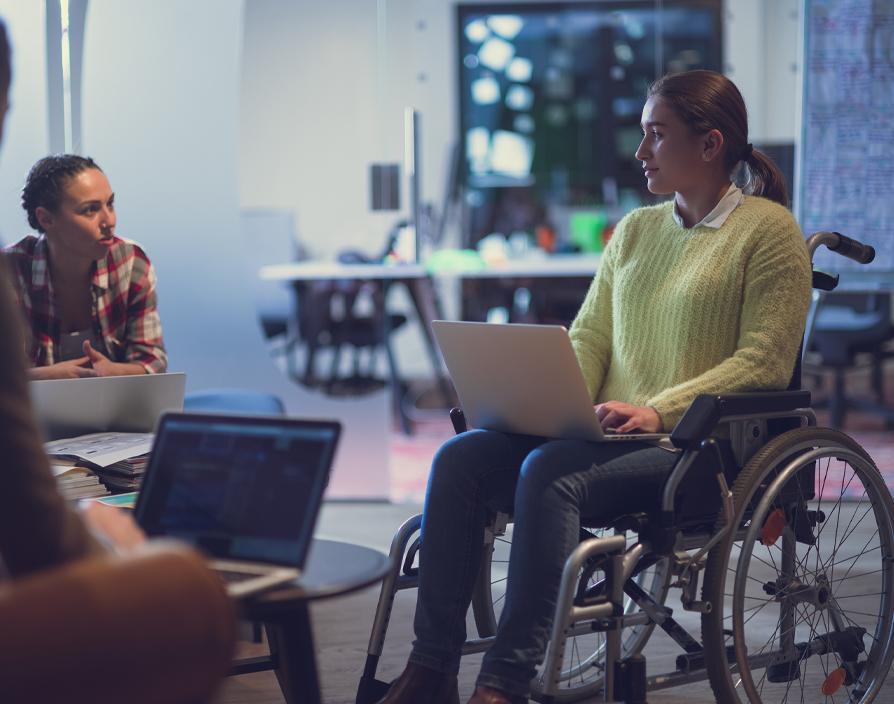There is an abundance of entrepreneurial skill and ambition amongst disabled entrepreneurs, who tend to over-index on problem solving, creativity and innovation, as all small businesses do, but often even more so due to the resilience required to start and grow a business with the hurdles society places in front of them.
Estimated at over a quarter of all entrepreneurs, disabled founders are an important economic force for the UK. However, systemic changes are needed to make UK entrepreneurship more equitable, accessible, and inclusive.
And this is the focus of a new report examining disability and entrepreneurship that Small Business Britain recently launched with Lloyds Bank. Consulting over 500 disabled and neurodiverse founders across the UK, the research powerfully underlines that there is still much to be done to unlock the full power of a truly diverse and inclusive entrepreneurial community.
One of the most compelling findings in the research is that many disabled entrepreneurs start businesses for reasons unconnected with disability; 51 per cent were keen to be their own boss and 53 per cent were motivated to turn a passion into a business. Entrepreneurship also brings freedom to determine your own path and working style, as well as huge flexibility.
Further to this, 35 per cent said their disability has positively impacted them as an entrepreneur, and 17 per cent said that customers viewed them more positively because of their disability. A high proportion of founders regarded skills developed through their lived experience of disability – such as agility, creativity, resilience and problem-solving – as great entrepreneurial assets and deserving of more recognition by society.
Indeed, what stood out the most during this research is the shift that is required from talking about deficiency and weakness to talking about skills and strengths. When looking at the journey of entrepreneurs from childhood, through education, to starting up and growing, there has too often been a focus on what disability detracts from the entrepreneur, and not what the individual brings.
There is a focus on where disabled people need support, and rightly so, but in a way that does not empower individuals, but diminishes them. The point made so well by entrepreneurs is that their lived reality is their life – it is not abnormal or “different”; it is society that says it is different from the norm. The responsibility should therefore be on society to reassess and create a world that does not disable people. That is the way to real inclusiveness.
As well as a lack of credit by wider society, the report also highlighted significant hurdles holding founders back, including higher start-up costs and challenges accessing funding and support. Over half (56 per cent) of disabled founders said they encountered no external support when starting up their businesses. 72 per cent said they had lacked appropriate role models to guide them and 55 per cent received no financial support, despite being likely to face considerable additional financial hurdles. The most common source of funding by far is friends and family at close to 20 per cent, followed by grants at around 9 per cent of entrepreneurs.
As a result, many talked of having to leap into entrepreneurship earlier than ideal, due to difficulties running a venture alongside employment, as well as shouldering additional costs, such as assistive equipment. According to research by the disability equality charity Scope, on average disabled people face £583 of additional living costs per month, an issue that has only been heightened by the cost-of-living crisis.
This lack of financial support extends out to other forms of support. Much of the UK’s business support landscape is not designed to be accessible. Barriers that inhibit progress for disabled and neurodiverse entrepreneurs can come from the smallest detail – the contrast of a website, the length of form required for services and the density of text, through to the need to attend in person. Whether it be programme design, language or even font choice, much is done without consideration about the way a wide variety of entrepreneurs will access support.
And this comes amid fears that progress seen during the pandemic – when work, training and events moved online and became multi-channel – is being reversed with the return to more face-to-face activity.
The UK has a big opportunity to take greater action to empower this cohort of the entrepreneurial community to reach their full potential and unlock UK growth opportunities.
So how do we do this? Our report highlights a series of recommendations. We need an overhaul in the accessibility and inclusivity of support offered across the small business landscape, encompassing everything from programme design and mode of delivery, to language and look and feel of content. There is also a need to tackle stigma, and ensure that entrepreneurship is a positive choice, not a last resort because employers cannot accommodate the needs of workers.
More accessible and relevant financing needs to be available and actively offered to disabled entrepreneurs too. We need to review start-up hurdles to reduce the need for additional funding or the pressure on early-stage businesses to turn to debt or give up on the dream of entrepreneurship altogether.
There is also a huge gap for disabled mentors, and a significant appetite for it. The extra layer of experience of navigating a complex business landscape with a disability is an invaluable shared skill that founders are keen to access. Feeling understood by a mentor, and not having to explain at length the hurdles you are facing, has been shared by entrepreneurs as a critical part of unlocking value from the mentoring experience.
Finally, an increase in the consultation of people with lived experience when designing all aspects of programmes should be done upfront. All organisations involved with the entrepreneurial journey should bring in experienced disabled founders at the outset to ensure programmes are truly accessible.
If we design a world that bolts on accessibility, or as an adjustment to the regular delivery of things, then we are not being truly inclusive and we lose the incredible value that disabled entrepreneurs bring to entrepreneurship. We lose innovation and problem solving; we lose that contribution to GDP and employment; and we lose the opportunity to be the inclusive, compassionate, open and supportive society we wish to be.
Working on this report has been incredibly enlightening, and hopefully will give other businesses and individuals pause for thought in the way we approach entrepreneurship and how we build the world of business in the future.
You can access Small Business Britain’s ‘disability and entrepreneurship’ report in plain text here, and listen to our audiobook version here.
Share via:









































